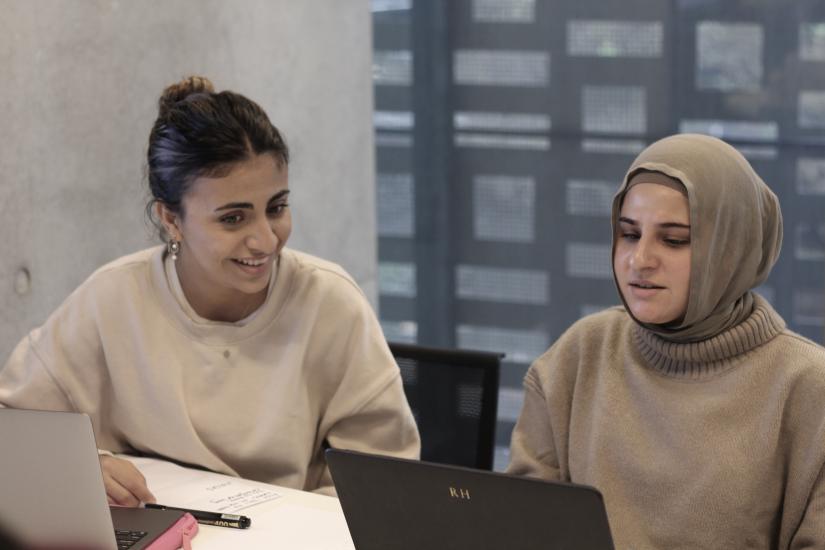A new type of university electives at UTS is giving undergraduate students a roadmap for success beyond traditional career paths.
In the year preceding February 2022, about 10 percent of all Australians changed jobs, marking the highest increase of employment mobility the nation has seen in a decade.
Interestingly, this shift was not isolated to a single trade or industry, but spread across all sectors from financial services, the arts, scientific and technical industries, agriculture and transport.
So, how are we better preparing graduates to face the predictable upheaval of modern employment?
Enter the TD Electives program - an opportunity for all UTS undergraduate students to learn outside, beyond and across a single faculty to experience real-world collaboration with peers from across the disciplines.
Ekaterina Frolov, Bachelor of Medical Science student, said her first transdiciplinary learning experience in the TD Electives changed her perspective on how her university education could be applied in a range of professional contexts.
“It made me think more broadly, outside of my science box,” she said.
“Before this subject, I thought my options were working in a lab or working in research and I think that has really changed my trajectory.”
Before this subject, I thought my options were working in a lab or working in research and I think that has really changed my trajectory.
– Ekaterina Frolov, medical science student
In the TD Electives program, students are exposed to the building blocks of transdisciplinary practice, while working in teams to solve a live brief provided by a lead industry partner.
Designed to further enhance UTS’ hands-on learning experiences that encourage work ready graduates, by 2025, all undergraduate students will pick one specially designed subject to study from a suite of eight subjects.
It’s also about encouraging students to maximise their contribution to whatever endeavour awaits them beyond their undergraduate studies, including pathways for TD activated research and academic careers.
This year, the first two subjects were unveiled. The first, Reframing, Remixing, Reimagining Society (lead industry partner, the Australian Red Cross) and the second, Sustainability in an Interconnected World (lead industry partner, Regen Studios).
It’s a rejig on more traditional university electives, combining students together in the one classroom environment from across the seven UTS faculties. Drawing inspiration from the award winning BCII program, students learn to unpack complexity and how to work with others to meaningfully intervene in wicked systems through the lens of a real industry challenge.
In Reframing, Remixing and Reimagining Society, a learning question was developed with the Australian Red Cross for students to understand and think differently about humanitarian work. Student groups then explored how young people might be able to generate insights and actions that could lead to a more resilient and inclusive society.
How might Red Cross activate young Australians to create more resilient communities that can adapt to the effects of a changing climate?
“Having people of all different disciplines coming together and sharing ideas and building into this problem has been great - it’s been really fun,” said Chris Kohout, Bachelor of Medical Science student.
Students said they also enjoyed the opportunity to study a subject with peers from different degrees, mirroring how different professions might be able to positively contribute to the workplace.
Another highlight for the students was getting to know the staff who were involved in the subject from the Australian Red Cross, and the diverse work they do.
“From a student perspective, understanding the different types of roles you can have in an organisation like that is so valuable,” said Ekaterina.
“Knowing people with degrees like mine can do practical things in a humanitarian manner was quite revolutionary to me."

The call in the TD Electives to catalyse social impact through this first encounter with transdiciplinary practice also extended beyond the subject for some students.
“I was inspired to create a WhatsApp group chat with my neighbours because we live in four different unit blocks close to each other. We used to say ‘hi’ to each other but didn’t have a place where we could chat or ask if anyone needs something,” said Ekaterina.
“I did that because of this subject, and I wouldn't have done it otherwise.
“I feel much more community minded. I feel much more willing to open myself up to casual contact with my neighbours, or people in the community, or seizing opportunities such as going to a community forum or thinking about opportunities for community engagement.
In addition to shifting perspectives in a “pretty permanent way,” Ekaterina said she also saw how being taught unique applications of disciplinary knowledge is highly sought-after by employers.
“I see problem spaces coming up much more in job applications and in the practical sphere of applying theory,” she said.
Knowing people with degrees like mine can do practical things in a humanitarian manner was quite revolutionary to me.
– Ekaterina Frolov, medical science student
In the TD Electives, students learn to dive into complex human problems that are constantly changing, highlighting the importance of intervening with ambiguity and the scope of problem undefined.
“You need to understand and get familiar with that uncertainty.”

